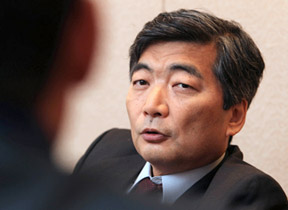'Lanka's economic performance solid'
by Lalin Fernandopulle
The International Monetary Fund (IMF) said that Sri Lanka can achieve
a 6.5 percent Gross Domestic Product (GDP) growth rate this year backed
by strong economic fundamentals.
|

IMF's Deputy Managing Director Naoyuki Shinohara |
IMF, Deputy Managing Director Naoyuki Shinohara who was on a short
visit to Sri Lanka last week said that the IMF is confident Sri Lanka
can achieve this growth rate as envisaged by the IMF early this year.
"There has to be a strong commitment by the government to reduce the
budget deficit which we hope policy makers will address in the 2014
Budget," he said.
"Reducing the budget deficit is vital to accelerate growth and reduce
borrowing," Shinohara said.
The IMF has urged the government to boost tax revenue to tackle a
relatively high budget deficit and public debt level.
The IMF forecast an economic growth rate of 6.5 percent for the
current year, a full percentage point lower than the Central Bank's
recent forecast of 7.5 percent.
Low exports due to weak overseas markets, slow credit disbursement to
the private sector and flat government revenues will slow the pace of
growth, an IMF official said.
The IMF is also pleased with the post-program economic performance of
Sri Lanka on sustaining growth with low inflation and flexible exchange
rate.
Growth rate is sound, inflation is good, current account is stable
and the exchange rate is flexible, Shinohara said.
"In my meetings, I commended the authorities for delivering strong
growth, low inflation, fiscal consolidation, and a strengthening of the
external accounts since the end of terrorism in 2009, and on the
ambitious growth and development objectives laid out in the Mahinda
Chinthana. Sri Lanka has also kept up its solid economic performance in
the face of recent adverse external conditions," he said.
"Our discussions focused on how to accelerate and sustain growth,
ensure macroeconomic and financial stability, and take advantage of
regional and global integration. Fiscal consolidation has been steady,
and the authorities are committed to further reduce the budget deficit
and public debt, which remain relatively high," Shinohara said.
"In this context, I support the authorities' efforts to boost revenue
by broadening the tax base and strengthening tax administration -
creating opportunities to further reduce the deficit while raising
public investment. Private investment, including FDI, could be supported
through improvements in the business environment," he said.
Shinohara also stressed the importance of pursuing a cautious
monetary policy, keeping in mind past challenges with inflation, the
risks posed by Fed tapering and the need to assess the impact of
monetary easing already undertaken. "I think that Sri Lanka would
continue its flexible exchange rate regime -allowing it to serve as a
key buffer against external shocks," he said.The International Monetary
Fund completed the US$ 2.6 billion Stand-By Agreement last year boosting
Sri Lanka's foreign reserves. The IMF said it has not discussed a new
program with Sri Lanka.
"We are ready to discuss the issue if there is a request for a
program by the government," Shinohara said.
He said that in the short-term Sri Lanka faces external risks
following the tapering by the US Federal Reserve. Sri Lanka is better at
weathering it that many other countries with large deficits. Sri Lanka
has access to international markets though the scale is limited. In the
medium-term, the global economy will slowdown further.
It will have an adverse impact on Sri Lanka's exports.
With regard to the state-owned entities such as the Ceylon Petroleum
Corporation, Ceylon Electricity Board, he said that the IMF is happy
about the recent increase in electricity tariffs to boost revenue to the
institution.
He said that the IMF was concerned about the numbers and not how it
was managed.
He said that the IMF has not changed its forecast for Sri Lanka next
year and added that it is concerned about the government addressing the
budget deficit.
"The IMF will continue to work closely with the authorities to
provide high-quality policy advice to enhance stability and growth and I
look forward to continuing our cooperation," Shinohara said.
|

